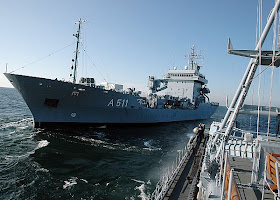.jpg) The German Navy auxiliary repair ship FGS Elbe (A511) comes alongside the German Navy fast attack craft FGS Nerz (P 6124) during exercise Baltic Operations (BALTOPS). This is the 37th iteration of BALTOPS and is intended to improve interoperability with partner nations by conducting realistic training at sea with the 12 participating nations. (U.S. Navy photo by Mass Communication Specialist 3rd Class Christian T. Martinez/Released)
The German Navy auxiliary repair ship FGS Elbe (A511) comes alongside the German Navy fast attack craft FGS Nerz (P 6124) during exercise Baltic Operations (BALTOPS). This is the 37th iteration of BALTOPS and is intended to improve interoperability with partner nations by conducting realistic training at sea with the 12 participating nations. (U.S. Navy photo by Mass Communication Specialist 3rd Class Christian T. Martinez/Released)By Mass Communication Specialist 3rd Class Christian T. Martinez, Commander, U.S. Naval Forces Europe-Commander, U.S. Naval Forces Africa/Commander, U.S. 6th Fleet Public Affairs
FGS ELBE, At Sea (NNS) -- German auxiliary repair ship FGS Elbe (A 511) provides support to more than 40 allied ships participating in Baltic Operations (BALTOPS) exercise.
"This is why you join the Navy, to work in an allied environment," said German Cmdr. Senior Grade Stephen Haisch, commander of Fast Attack Squadron 7. "It's important to train with other nations because we have a lot to teach each other."
Elbe's mission is to support smaller units by providing everything from ammo and fuel to spare parts and technical assistance. Elbe is also armed with a forward supply specialist unit specifically designed for maintenance on engines and weapons systems at sea.
Although Elbe is equipped with the tools that it needs to support its ships, the crew has had a major overhaul and is in the midst of integrating all new personnel. Elbe's mission will not only help support partner nations, but it will give the new crew a chance to participate in crucial training throughout the duration of BALTOPS.
"We receive the training benefit, but we also get to show our capabilities to the other units, especially other nations' navies," said German Lt. Alexander Wiegleb, duty officer for the command task unit stationed aboard Elbe. "Altogether, it's a great honor for German units to be involved in this multinational maneuver."
BALTOPS is comprised of forces from 12 countries and is the largest multinational naval exercise this year in the Baltic Sea. The exercise aims to improve maritime security in the Baltic Sea through increased interoperability and cooperation among regional allies.